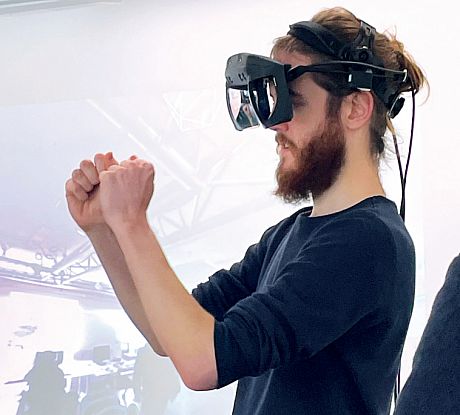Creative Computing & Play
Creative computing and play is a trans-disciplinary research cluster experimenting with games, play, and the aesthetic possibilities of technology. We consider the game-like elements of our "real-world" structures, and the realities of our lives as playful creatures, artists, and theorists.
We seek collaborations across the arts, technology and Digital Humanities in order to research:
 Experimental computing to foster alternative methods of analysis and representation, creating new instruments and environments to shape the future of the Digital Humanities.
Experimental computing to foster alternative methods of analysis and representation, creating new instruments and environments to shape the future of the Digital Humanities.- Playable, as it invites diverse behaviours in the form of explorations, expressions, disruptions, preservations, reparations, and sustainability.
- Meaningful play which discovers new forms of expression and counter-narratives to the hegemonic, and unlocks new or alternative forms of public sensitivity and consciousness.
- Collaborative, as creative computing, playful improvisations, and game systems bring academic, public, community organisations, and industry specialists together in the research process.
- Innovative, as new interface, software, instruments, installations, systems,performances, methods, are being developed, applied, reviewed and situated.
Research includes but is not limited to:
Creative computing
- Artificial intelligence and Artificial Life in imagined
Systems
- Creative Coding – audiovisual systems, including robotics, games, and installations
- Data made experientially available to vision, sound, and haptic understanding
- Generative art (for processor-based systems and games)
Performative computing
- Liveness and improvisation with the arts and technologies (inc. live coding, media archaeology, robot performance, aesthetic programming)
Art, Technology and DH Research
- Art, technology and DH practice & theory
- Behaviour, play theories and politics of location in DH
- Cognition and Embodiment in computational systems (tactile media, spatial audio, installations, interface)
- Collaboration (e.g. cross and transdisciplinarity,communities, organisations)
- Computational aesthetics
- Critical code studies, software practice and theories
- Feminist praxis in DH
- Critical fabulation & imaginaries
- Methods/approaches in art, technology and DH (datafication, preservations, decolonization, social change, social justice, ethics…)
SHL researchers working in this cluster include (alphabetical order):
Dr Cecile Chevalier , Dr Alice Eldridge, Dr Kate Howland, Prof Ed Hughes, Dr Chris Kiefer, Dr Sam Ladkin, Prof Thor Magnusson , Dr Ben Roberts,Dr Ivor Simpson, Dr Joseph Walton, Prof David Weir
PROJECTS IN THIS CLUSTER INCLUDE:
- Designing Interfaces for Creativity
PI: Chris Kiefer
The Designing Interfaces for Creativity symposium took place in November 2016, bring together artists, designers, scientists, historians and hackers to discuss the design on new interfaces for creativity.The two-day event brought fifty people together for concerts, a day of practical workshops and a day of keynotes and panel discussions.
Funded by a British Academy Rising Star Engagement Award
- Feedback Musicianship
- Hacking Your Way to IT Literacy
'Hacking Your Way to IT Literacy: What digital societies can (and need to) learn from digital learning in hackerspaces' uses digital ethnography and other methods to explore how informal learning takes place in hacker- and makerspaces. Commencing in late 2019, this research has engaged in particular with how hacker- and makerspaces have learned from and responded to the Covid-19 pandemic.
Funded by MSCA
- Networking technology and the experience of ensemble music-making
PI: Ed Hughes (SHL Associate)
Co-Is: Alice Eldridge and Chris Kiefer (SHL)The initial project ran from 1 Sept 2015 to 31 March 2016 and explored whether networking technology can help more people access the benefits of ensemble music-making in schools and community settings, and was featured in the Brighton Science Festival in February 2016.
The project has recently been awarded follow-on funding from the AHRC to develop and release their dynamic, networked notation software as a series of iOS and android apps.
Funded by AHRC
- Sonic Writing: Technologies of Musical Expression, Notation and Encoding
PI: Thor Magnusson
The Sonic Writing research project explores work and practices using new technologies for musical expression. Through tracing the historical conditions of material and symbolic design in three interconnected strands of inscription - instruments, notation, and phonography - the project studies how established techniques are translated into new methods of musical composition and performance in digital musical media.
Funded by AHRC